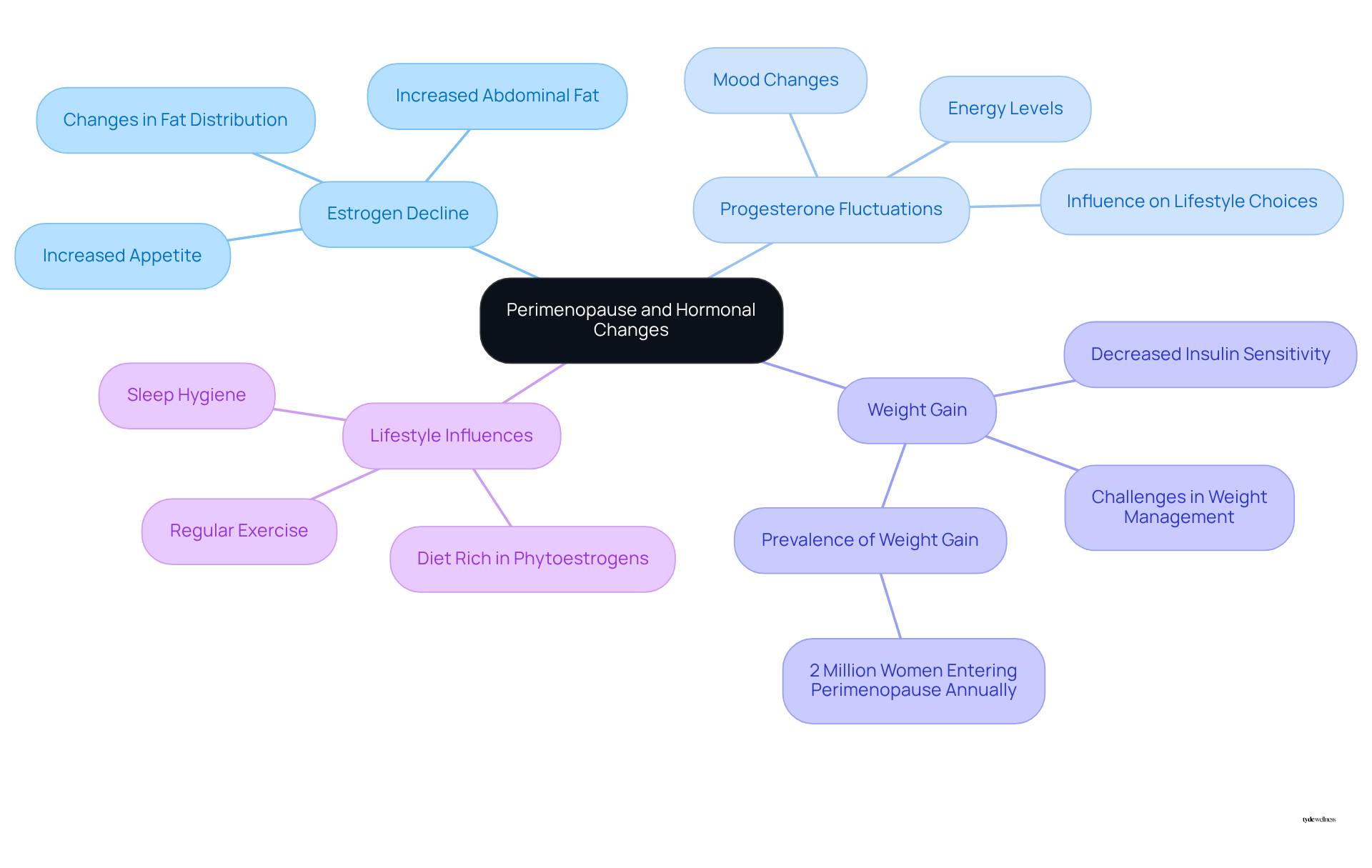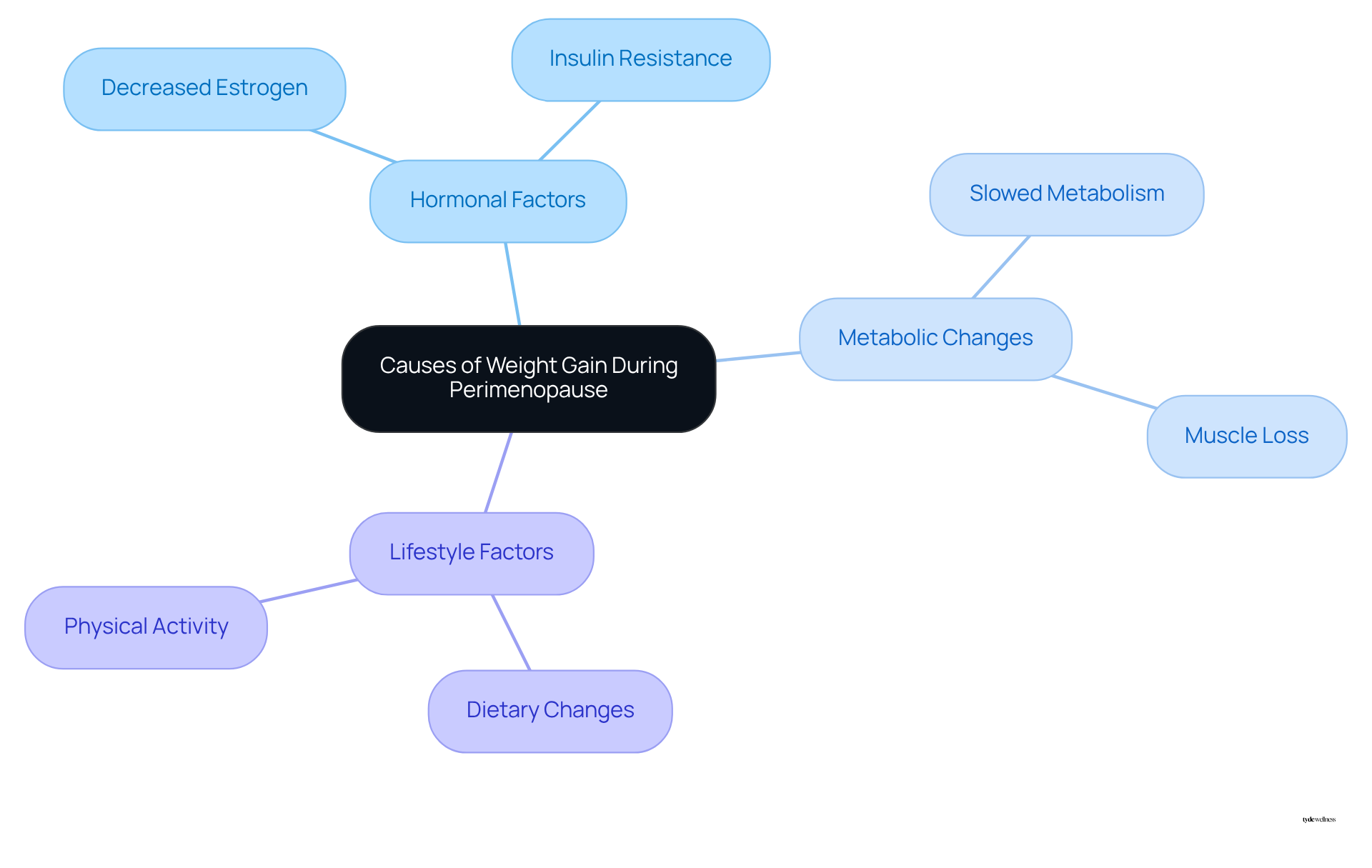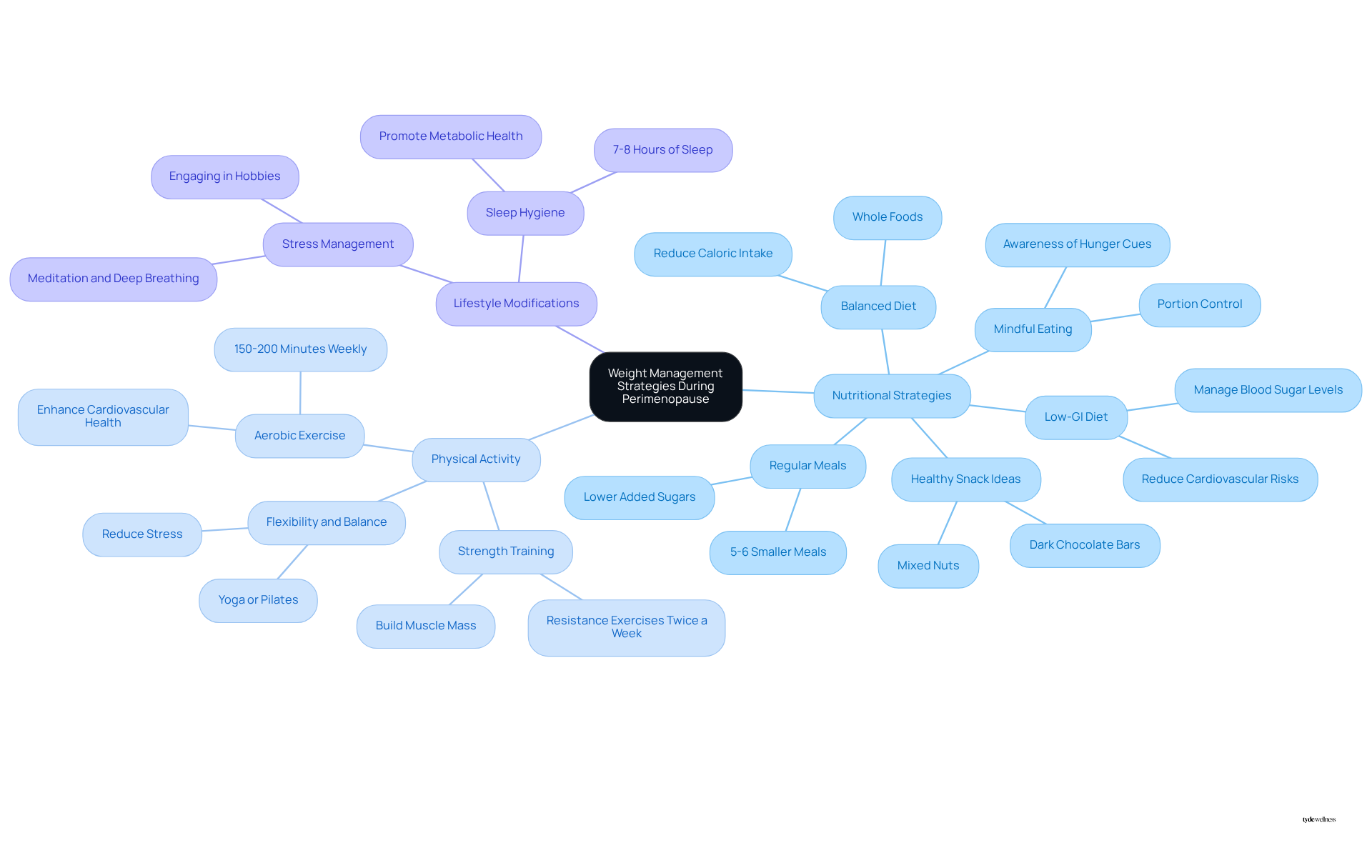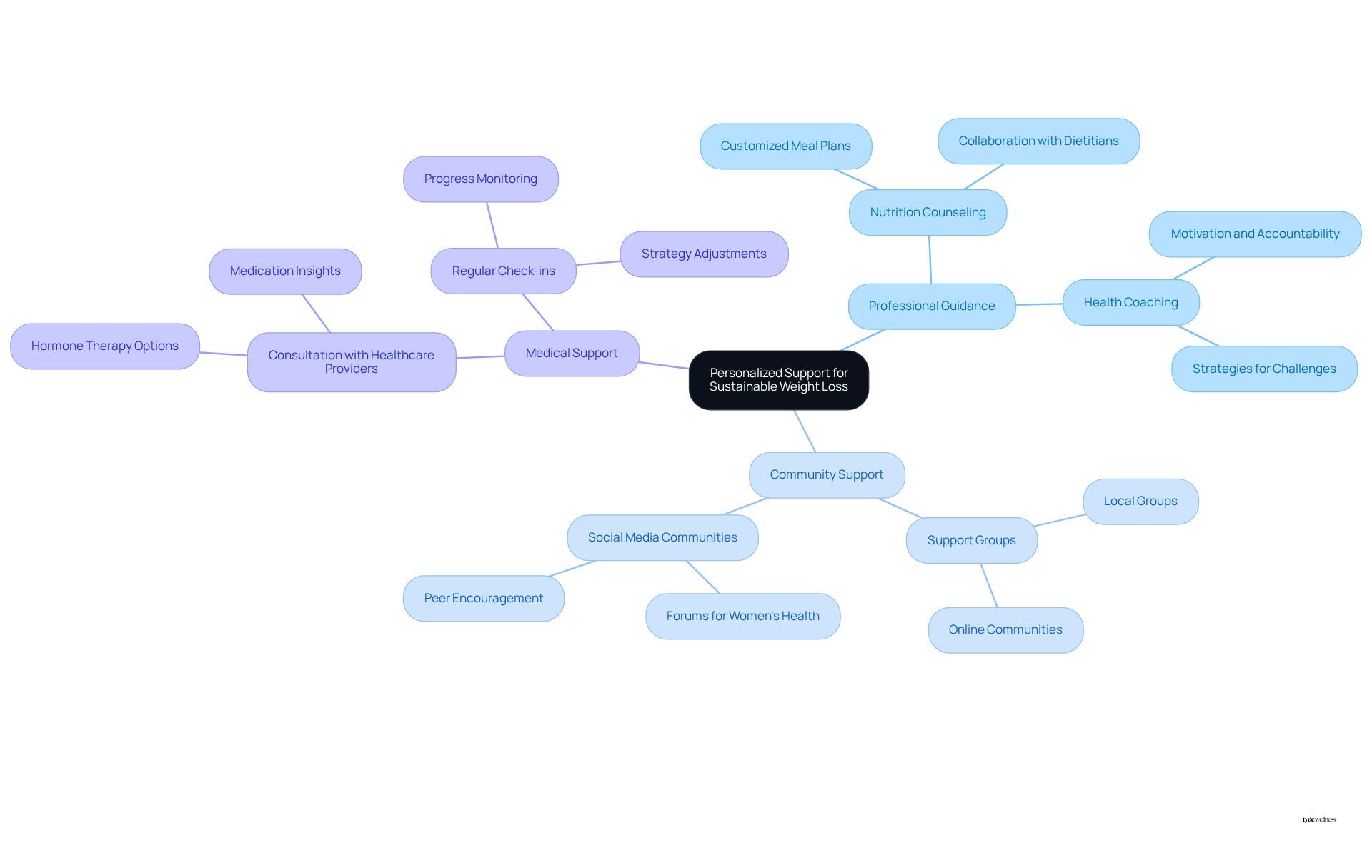Overview
Weight gain during perimenopause is primarily attributed to hormonal changes, notably decreased estrogen levels and increased insulin resistance. These factors significantly alter body composition and metabolism. To address this issue, various management strategies are outlined, including:
- Dietary adjustments
- Regular physical activity
- Personalized support
These approaches empower women to effectively navigate this transitional phase and mitigate weight gain, ultimately enhancing their overall well-being.
Introduction
Navigating the complexities of perimenopause can be a daunting experience for many women, particularly as hormonal fluctuations often lead to unexpected weight gain. This transitional phase, typically occurring in the 40s, introduces not only physical changes but also emotional challenges that complicate weight management.
Understanding the underlying causes of weight gain during this period is crucial; it opens the door to effective strategies for maintaining a healthy body composition.
Furthermore, how can women empower themselves to tackle these changes head-on and reclaim control over their health during this pivotal time?
Define Perimenopause and Its Hormonal Changes
Perimenopause is the transitional period leading up to menopause, typically occurring in women in their 40s. During this phase, the ovaries gradually decrease their production of estrogen and progesterone, resulting in irregular menstrual cycles and a range of physical and emotional symptoms. Hormonal fluctuations can cause changes in body composition, including increased fat storage, particularly around the abdomen. Understanding these hormonal shifts is crucial for recognizing the underlying causes of weight gain perimenopause during this period.
Key Hormonal Changes:
- Estrogen Decline: As noted by Dr. Stephanie Faubion, the reduction in estrogen levels can lead to increased appetite and changes in fat distribution, making weight management more difficult. This decline can significantly alter how the body stores fat, leading to weight gain perimenopause, especially in the abdominal area.
- Progesterone Fluctuations: Irregular progesterone levels can impact mood and energy, influencing lifestyle choices related to diet and exercise. Mary Jane Minkin emphasizes that understanding these physiological changes is essential for women to navigate this transitional phase successfully.
- Weight gain perimenopause: Hormonal fluctuations may lead to decreased insulin sensitivity, which can make weight gain during perimenopause easier. Each year, approximately 2 million individuals in the United States enter perimenopause, underscoring the prevalence of these challenges.
Recognizing these shifts helps women understand their bodies more effectively and prepares them for the subsequent sections on management strategies. Additionally, lifestyle changes such as a diet rich in phytoestrogens and regular exercise can significantly influence the management of symptoms and body weight during perimenopause.

Explore Causes of Weight Gain During Perimenopause
Weight gain during perimenopause can be attributed to several interrelated factors:
Hormonal Factors:
- Decreased Estrogen: Lower estrogen levels can lead to increased abdominal fat and changes in fat distribution.
- Insulin Resistance: Hormonal changes can lead to insulin resistance, making it more difficult for the body to control blood sugar and resulting in increased body mass.
Metabolic Changes:
- Slowed Metabolism: Aging and hormonal changes can slow down metabolism, requiring fewer calories for maintenance.
- Muscle Loss: A decrease in muscle mass, common during this phase, can further reduce metabolic rate.
Lifestyle Factors:
- Dietary Changes: Increased cravings and emotional eating can lead to higher caloric intake. A balanced diet abundant in fiber, lean proteins, and whole foods is crucial for managing body composition during this transitional phase.
- Physical Activity: Many females experience fatigue and mood changes, which can diminish motivation to exercise, contributing to increased mass. It is advised that individuals strive for a minimum of 150 minutes of moderate-intensity physical activity each week to assist in managing body composition.
Identifying these factors enables women to embrace proactive approaches for successful management during this transitional phase. As Heather Newell, APRN, notes, ‘Weight gain perimenopause is not inevitable.’ By understanding what’s happening in your body and taking proactive steps, you can navigate this transition confidently.

Implement Effective Weight Management Strategies
To effectively manage weight during perimenopause, consider the following strategies:
Nutritional Strategies:
- Balanced Diet: Emphasize a diet rich in whole foods, including fruits, vegetables, lean proteins, and healthy fats. This approach stabilizes blood sugar levels and reduces cravings, which is essential as hormonal changes can lead to weight gain perimenopause and increased appetite. Additionally, women may need to consume about 200 fewer calories daily during their 50s compared to their 30s and 40s.
- Mindful Eating: Cultivate awareness of hunger cues and practice portion control to prevent overeating. This technique helps mitigate the tendency to consume excess calories, particularly during emotional or stressful times.
- Regular Meals: Aim for 5-6 smaller meals throughout the day to sustain energy levels and stave off excessive hunger. This strategy regulates metabolism and assists in managing body composition efforts. Lowering added sugars, which represent almost 300 calories daily in the typical American diet, is also crucial for preventing weight gain perimenopause and successful body mass management.
- Low-GI Diet: Consider adopting a low-glycemic index (GI) diet, which is linked to decreased risks of cardiovascular disease and diabetes in postmenopausal individuals. Foods with a low GI score can help manage blood sugar levels and aid in weight loss.
- Snack Ideas: Incorporate healthy snacks such as dark chocolate bars, mixed nuts, or hummus with whole grain pita to maintain energy levels and prevent cravings.
Physical Activity:
- Strength Training: Incorporate resistance exercises at least twice a week to build muscle mass, which is essential for boosting metabolism. Research indicates that women over 40 can benefit significantly from strength training, as it helps counteract the natural decline in muscle mass associated with aging.
- Aerobic Exercise: Engage in regular aerobic activities, such as walking, swimming, or cycling, aiming for at least 150 to 200 minutes per week. This not only promotes calorie burning but also enhances cardiovascular health, which is vital during this life stage.
- Flexibility and Balance: Include activities like yoga or Pilates to improve flexibility and reduce stress. These practices enhance overall well-being and promote mental health during perimenopause.
Lifestyle Modifications:
- Sleep Hygiene: Prioritize quality sleep, as inadequate rest can exacerbate weight gain and hormonal imbalances. Most adults should aim for 7 to 8 hours of sleep each night to promote metabolic health.
- Stress Management: Implement stress-reducing techniques such as meditation, deep breathing, or engaging in hobbies. Effectively managing stress can prevent emotional eating and promote healthier lifestyle choices.
By applying these strategies, individuals can attain sustainable body management and improve their overall well-being during perimenopause. Furthermore, considering medical assistance like GLP-1 medications, which have demonstrated an average loss of 16% over 68 weeks, can further aid in management efforts.

Utilize Personalized Support for Sustainable Weight Loss
Customized assistance plays a vital role in enhancing weight gain perimenopause efforts. Here are effective ways to access and utilize such support:
Professional Guidance:
- Nutrition Counseling: Collaborate with a registered dietitian or nutritionist specializing in women’s health to develop a customized meal plan that aligns with your lifestyle and preferences. Effective nutrition guidance can lead to significant management enhancements; studies show that individuals in Tyde Wellness’s program report an average body mass reduction of 15% after 68 weeks, with many women experiencing mass loss exceeding 20-25% within a year when adhering to tailored programs.
- Health Coaching: Engage with a health coach who can provide motivation, accountability, and strategies to navigate challenges effectively.
Community Support:
- Support Groups: Join local or online support groups where women share experiences, challenges, and successes related to weight management during perimenopause. Research indicates that community involvement can greatly enhance motivation and commitment to weight loss strategies, especially in the context of weight gain perimenopause, highlighting the importance of shared experiences.
- Social Media Communities: Participate in forums or social media groups focused on women’s health to gain insights and encouragement from peers, fostering a sense of belonging and shared experience.
Medical Support:
- Consultation with Healthcare Providers: Discuss options such as hormone therapy or medications that may assist in managing weight and alleviating hormonal symptoms. Medical professionals can provide valuable insights into how to balance dietary changes with potential treatments.
- Regular Check-ins: Schedule consistent follow-ups with healthcare professionals to monitor progress and adjust strategies as needed, ensuring that your approach remains effective and aligned with your health goals.
Utilizing personalized support not only increases the likelihood of achieving weight loss goals but also cultivates a sense of community and empowerment during this transitional phase, as evidenced by the comprehensive approach of Tyde Wellness.

Conclusion
Understanding the complexities of weight gain during perimenopause is crucial for women navigating this transitional phase. The interplay of hormonal changes, metabolic shifts, and lifestyle factors creates a unique challenge that can lead to increased body weight, particularly around the abdomen. Recognizing these elements empowers women to take control of their health and weight management strategies.
The article highlights several key factors contributing to weight gain during perimenopause, including:
- Decreased estrogen levels
- Insulin resistance
- Slowed metabolism
- Lifestyle changes such as dietary habits and physical activity levels
By implementing effective management strategies—ranging from nutritional adjustments and mindful eating to regular exercise and personalized support—women can combat these challenges and achieve sustainable weight loss.
Ultimately, embracing a proactive approach to weight management during perimenopause is essential for overall well-being. By seeking professional guidance, participating in supportive communities, and making informed lifestyle choices, women can navigate this period with confidence. Taking these steps not only helps in managing weight but also enhances quality of life, reinforcing the significance of understanding and addressing the unique challenges posed by perimenopause.
Frequently Asked Questions
What is perimenopause?
Perimenopause is the transitional period leading up to menopause, typically occurring in women in their 40s, during which the ovaries gradually decrease their production of estrogen and progesterone.
What hormonal changes occur during perimenopause?
During perimenopause, there is a decline in estrogen and fluctuations in progesterone levels, which can lead to irregular menstrual cycles and various physical and emotional symptoms.
How does the decline in estrogen affect weight management?
The reduction in estrogen levels can lead to increased appetite and changes in fat distribution, particularly around the abdomen, making weight management more challenging.
What impact do progesterone fluctuations have during perimenopause?
Irregular progesterone levels can affect mood and energy, influencing lifestyle choices related to diet and exercise, which can further complicate weight management.
Why is weight gain common during perimenopause?
Hormonal fluctuations during perimenopause can lead to decreased insulin sensitivity, making weight gain easier. This is a common issue for many women entering this transitional phase.
How prevalent is perimenopause?
Approximately 2 million individuals in the United States enter perimenopause each year, highlighting the widespread nature of these challenges.
What lifestyle changes can help manage symptoms during perimenopause?
Lifestyle changes such as adopting a diet rich in phytoestrogens and engaging in regular exercise can significantly influence the management of symptoms and body weight during perimenopause.
List of Sources
- Define Perimenopause and Its Hormonal Changes
- After Decades of Misunderstanding, Menopause is Finally Having Its Moment (https://medicine.yale.edu/news-article/after-decades-of-misunderstanding-menopause-is-finally-having-its-moment)
- Perimenopause Is Ruining My Sleep. What Can I Do? (https://nytimes.com/2025/06/17/well/perimenopause-sleep-tips.html)
- A HOT take on how to survive perimenopause | VCU Health (https://vcuhealth.org/news/a-hot-take-on-how-to-survive-perimenopause)
- ‘Shattered pane of glass’: The impact of perimenopause (https://abc.net.au/news/2025-05-02/perimenopause-signs-symptoms-hormones-help/105213314)
- Understanding perimenopause (https://uab.edu/news/health-medicine/understanding-perimenopause)
- Explore Causes of Weight Gain During Perimenopause
- Weight Gain in Perimenopause: Understanding the Causes and Taking Control (https://solutionhealth.org/2024/10/25/weight-gain-in-perimenopause-understanding-the-causes-and-taking-control)
- Understanding Weight Gain in Women During Perimenopause (https://medscape.com/viewarticle/midlife-weight-gain-women-understanding-hormonal-impact-and-2025a1000fjl)
- What Women With Perimenopause Weight Gain Should Know Before Going on GLP1s (https://health.usnews.com/wellness/articles/what-women-with-perimenopause-weight-gain-should-know-before-going-on-glp1s)
- Why am I gaining weight so fast during menopause? And will hormone therapy help? – UChicago Medicine (https://uchicagomedicine.org/forefront/womens-health-articles/2023/april/menopause-weight-gain-hormone-therapy)
- The reality of menopause weight gain (https://mayoclinic.org/healthy-lifestyle/womens-health/in-depth/menopause-weight-gain/art-20046058)
- Implement Effective Weight Management Strategies
- An Expert Answers Explains Perimenopause Weight Gain (https://healthline.com/health/menopause/an-expert-answers-how-can-i-maintain-my-weight-during-perimenopause)
- The reality of menopause weight gain (https://mayoclinic.org/healthy-lifestyle/womens-health/in-depth/menopause-weight-gain/art-20046058)
- Combination of obesity medication tirzepatide and menopause hormone therapy fuels weight loss (https://endocrine.org/news-and-advocacy/news-room/endo-annual-meeting/endo-2025-press-releases/castaneda-press-release)
- Menopausal belly fat is real. 5 things a dietitian did to combat it (https://today.com/health/diet-fitness/menopause-diet-tips-weight-gain-belly-fat-rcna100184)
- WeightWatchers Completes Financial Reorganization, Strengthens Leadership, and Expands Program Innovation to Support Women Through Menopause (https://corporate.ww.com/news/news-details/2025/WeightWatchers-Completes-Financial-Reorganization-Strengthens-Leadership-and-Expands-Program-Innovation-to-Support-Women-Through-Menopause/default.aspx)
- Utilize Personalized Support for Sustainable Weight Loss
- Can a Personalized Weight Loss Program Help During Menopause? – Nava Health (https://navacenter.com/can-a-personalized-weight-loss-program-help-during-menopause)
- Women turn to weight loss drugs in menopause: What to know about the benefits and risks (https://abcnews.go.com/GMA/Wellness/women-turn-weight-loss-drugs-menopause-benefits-risks/story?id=115067358)
- Flo for Perimenopause is Launching to Empower the 1 Billion+ Women Who Experience Perimenopause Without the Support They Deserve (https://finance.yahoo.com/news/flo-perimenopause-launching-empower-1-130500761.html)
- WeightWatchers names new medical chief, plans to offer menopause therapy and support (https://reuters.com/business/healthcare-pharmaceuticals/weightwatchers-names-new-medical-chief-plans-offer-menopause-therapy-support-2025-07-08)
- WeightWatchers Completes Financial Reorganization, Strengthens Leadership, and Expands Program Innovation to Support Women Through Menopause (https://corporate.ww.com/news/news-details/2025/WeightWatchers-Completes-Financial-Reorganization-Strengthens-Leadership-and-Expands-Program-Innovation-to-Support-Women-Through-Menopause/default.aspx)



